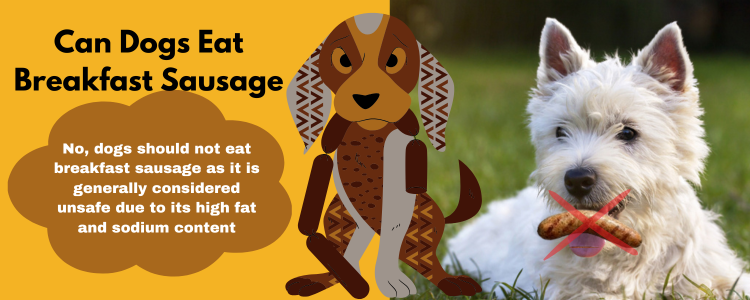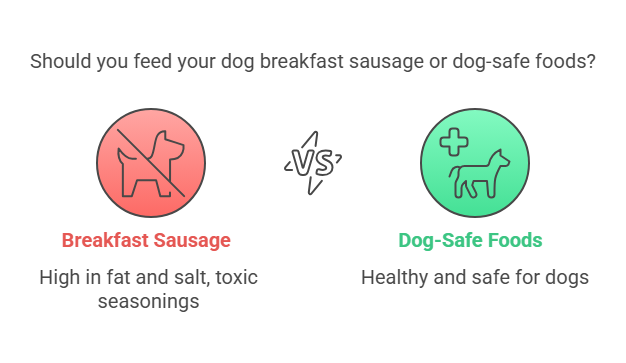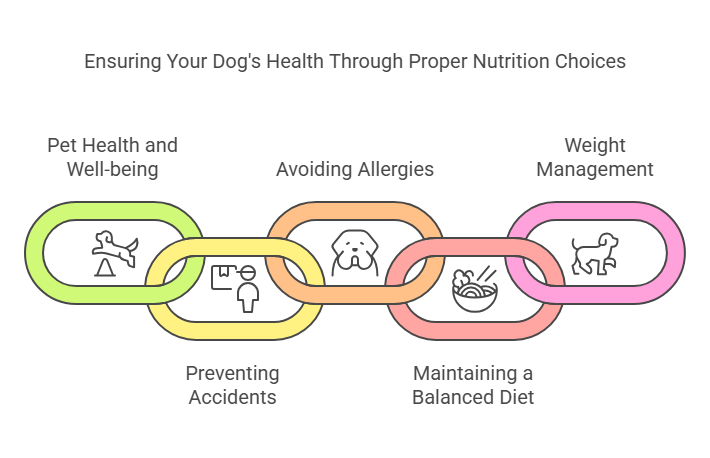No, it’s not the best idea to let dogs eat breakfast sausage. While it might be tempting to share your breakfast, sausages are often high in fat, salt, and spices, which can be harmful to dogs. Seasonings, like garlic and onion powder, are toxic to them. Plus, the high fat content can lead to pancreatitis or obesity.
If you want to treat your pup, stick to dog-safe foods like cooked plain chicken, carrots, or apples (without seeds). Always consult your vet before introducing new foods to your dog’s diet.
Importance Of Knowing What Your Dog Can Eat
Knowing what your dog can eat is crucial for several reasons:
1. Pet Health and Well-being
Different foods affect dogs in different ways. Feeding your dog the wrong foods can lead to health problems like obesity, pancreatitis, or even poisoning. For example, foods like chocolate, grapes, and onions are toxic to dogs and can cause severe health issues.
2. Preventing Accidents
Some dogs have food allergies or sensitivities. Knowing what your dog can and cannot eat helps in avoiding ingredients that could trigger allergic reactions, which can range from mild skin irritations to severe gastrointestinal issues.
3. Avoiding Allergies
Many dogs are allergic to ingredients like garlic, onion, or certain preservatives. These are often found in breakfast sausage. Knowing what’s safe prevents allergic reactions.
4. Maintaining a Balanced Diet
Dogs need specific nutrients to thrive. Feeding them inappropriate foods can lead to deficiencies. Breakfast sausage lacks the nutrients your dog needs for daily health.
5. Weight Management
Obesity is a major issue for dogs in the U.S. The Association for Pet Obesity Prevention reports that 59% of dogs in America are overweight or obese. High-fat foods like sausage contribute to this problem.
6. Behavioral Issues
Poor diet can lead to hyperactivity or lethargy. Sausage’s high-fat content may cause energy spikes, followed by crashes, affecting your dog’s mood and behavior.
7. Longevity
Dogs on balanced diets live longer. Avoid foods like breakfast sausage that might shorten their lifespan due to health complications.
8. Cost Savings
Vet visits can be expensive. Avoiding harmful foods helps save money on medical bills.
9. Legal and Ethical Considerations
Certain breeds have dietary restrictions due to genetic predispositions. It’s our responsibility to feed dogs safely and ethically.
10. Bonding and Enjoyment
Feeding your dog the right foods strengthens the bond between you and your pet. It shows that you care about their well-being and trust in your ability to keep them healthy.
Always consult your veterinarian for personalized advice on your dog’s diet, especially if you have concerns or if your dog has specific health conditions.
Potential Risks of Feeding Breakfast Sausage to Dogs
Feeding breakfast sausage to your dog poses several risks:
- High Fat Content: Breakfast sausage contains fats that are hard for dogs to digest. This can lead to pancreatitis.
- Spices and Seasonings: Ingredients like garlic powder and onion powder are toxic to dogs.
- Preservatives and Additives: Sausage often includes chemicals that can upset a dog’s stomach.
- Salt Levels: High sodium levels can harm a dog’s kidneys and lead to dehydration.
- Choking Hazards: Sausage casings can cause choking or blockages in small dogs.
Can My Dog Have A Small Portion of Breakfast Sausage?
A small piece of plain, cooked sausage might not harm a healthy dog. However, it’s not a recommended treat. The risks outweigh the benefits. If your dog eats sausage by accident, watch for symptoms like vomiting, diarrhea, or lethargy.
Alternative Protein Sources for Canine Breakfast Delights
Instead of sausage, offer your dog these healthy protein options:
- Cooked Chicken Breast: A lean, digestible protein source.
- Boiled Eggs: Packed with essential amino acids.
- Salmon: Rich in omega-3 fatty acids (cooked without seasoning).
- Turkey: Low-fat and safe if cooked plain.
- Cottage Cheese: A good source of calcium and protein in moderation.
Ensuring A Balanced and Nutritious Diet for Your Dog
A balanced dog diet includes:
- Protein: From meat, fish, or eggs.
- Carbohydrates: From rice or sweet potatoes.
- Fats: From fish oil or chicken fat.
- Vitamins and Minerals: Found in fruits and vegetables like carrots and blueberries.
Always consult your vet for a diet tailored to your dog’s needs.
Common Misconceptions About Feeding Dogs Human Food
1. “A Little Won’t Hurt”
Small amounts of harmful food can still cause issues. Toxic ingredients accumulate over time.
2. “My Dog Likes It”
Dogs may enjoy harmful foods but lack the ability to choose safe options. It’s our responsibility to protect them.
3. “It’s Just Meat”
Not all meats are the same. Seasonings, additives, and processing methods make sausage unsafe.
4. “My Dog Ate It Before and Was Fine”
Tolerating a food once doesn’t guarantee future safety. Effects can be cumulative.
FAQ About Dogs Breakfast
1. Can dogs eat sausage in any form?
No. Sausage contains fats, salts, and spices harmful to dogs.
2. What happens if my dog eats sausage?
Monitor for symptoms like vomiting or lethargy. Contact your vet if they appear unwell.
3. Are there dog-friendly sausages?
Yes. Some pet brands make sausages designed for dogs, free of harmful ingredients.
4. Is turkey sausage safer?
Turkey sausage is lower in fat but still contains seasonings and salt, making it unsuitable.
5. What is the healthiest protein for dogs?
Cooked chicken or fish are excellent options. They’re lean and easy to digest.
Conclusion
Dogs should avoid breakfast sausage due to its fat, salt, and harmful ingredients. Opt for healthier protein alternatives like plain chicken or boiled eggs. Always prioritize your dog’s health by feeding them a balanced diet and consulting your vet about safe options.



